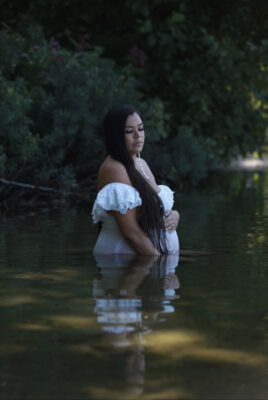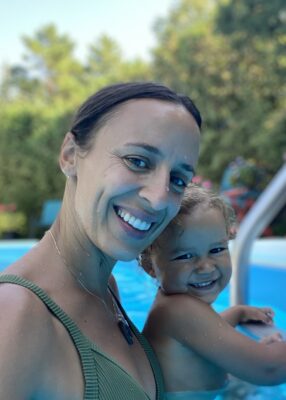National Forum Speaker Bios

Cassondra Commando
Cassondra Commando is a Mi’gmaw mother with ancestral responsibilities to the land, air and water. Cassondra belongs to the “People of the Dawn” Wabanaki Confederacy and has a strong passion for Mi’gmaq language revitalization, Mi’gmaq traditional hereditary governance and land as pedagogy. Cassondra holds a B.A. in Human Rights and Social Justice from Carleton University and is a certified Full Spectrum Indigenous Doula. Cassondra is newly enrolled with the Centre for Indigenous Midwifery in the Indigenous Child Birth Educators training and mentorship program and is expected to complete the curriculum in June 2024. In addition, Cassondra has recently completed the LSAT in November 2023 and is Law School Candidate in 2024.
Emma White
My name is Emma White, I am a first year Innu student midwife with the Innu Round Table Secretariat and I’m a member of the Mushuau Innu First Nation. My goals once finishing my program is to empower women and families to make informed choices, to inform and support their choice of birthplace and to provide continuity of care to people in my communities. Prior to joining the Innu Midwifery Program, I attended Med Quest in summer 2018 and this gave me insight on labor and delivery, and what a role in healthcare could look like, but I still wasn’t certain on what career path I wanted to take. In 2019 I remember reading Thea Penashue’ s birth story in a traditional Innu tent and became emotional because it was such a powerful and beautiful birth experience and thought that I wanted a similar birth experience one day. A few years later the opportunity presented itself to apply as an Innu Student Midwife and the more research I did on the role of a Midwife the more I realized this is what I want to do, not only do I want cultural safe birth experience, but I want the very same for Innu to have midwifery care with cultural safe and meaningful birth experiences.
Kim Bridle
My name is Kim Bridle, I’m currently a first year Innu student Midwife with the Innu Round Table Secretariat. I’m 22 years old and a mom of one. I currently reside in Happy Valley Goose Bay, and I am a member of Sheshatshiu Innu First Nation. I have always been interested in a career that involved helping others, before becoming a student midwife I was in between choosing a career as a social worker or a nurse. Prior to applying to the community-based Midwifery program, I had very little knowledge on what a Midwife was and how it was relevant to our healthcare system as I didn’t recall knowing that there were midwives around. Midwifery has inspired me as it involves helping women, babies and families staying together in such an important time in their lives. I feel close to Midwifery as my ancestors were Innu Midwives and I feel honored to be following in their steps. From my own prenatal, birth experience and post-natal I would have liked to have Midwifery care as I found that I lacked support in many areas of care. I am very excited to become a Midwife and give back to my community.
Gisela Becker
My name is Gisela Becker, and I am the Innu Midwifery Implementation Coordinator. I have been a midwife for many years and love working in Indigenous, northern, and remote communities! I believe in self-determination of Indigenous peoples including strengthening the health care system to be culturally safe, inclusive, and equitable. I have been involved in the Innu midwifery project since 2018 and feel honored to support the work of the Innu Round Table Secretariat to return Innu Midwives to Sheshatshiu and Natuashish. When I first arrived in Canada, I experienced the immense significance of returning birth to an Inuit community in the NWT what became later Nunavut. At the same time, I realized how limited and unsustainable the program was without Indigenous midwives providing culturally safe midwifery care to women and families in the community. I also learned that Indigenous midwifery and community births contribute to the healing of people and communities from the traumas of colonialism.
 Sara Leavitt
Sara Leavitt
Sara is the Project Manager of Métis Nation Saskatchewan’s Midwifery and Birthing Center. Prior to birth work, Sara worked locally and internationally with Indigenous communities in the areas of permaculture, food sovereignty, and community development. Sara is a mother of two beautiful children, after having her daughter in the hospital, she decided to birth her son at home under the care of a midwife. Experiencing the radical differences in care between a conventional hospital birth and midwife led home birth motivated Sara to begin working in the field of Indigenous midwifery.
Tisha Rabbitskin
Tisha Rabbitskin – Birth Support Worker (BSW) / Licensed Practical Nurse (LPN) : I graduated from Saskatchewan Polytechnic LPN Program in 2019. I was hired in Sturgeon Lake First Nation April 4, 2022, as a Birth Support Worker. I currently do prenatal and postnatal assessments and recently expanded programming to community single fathers and women who want to learn more of our cultural teaching.
Wanita Bear “Wanita Bear- Birth Support Worker (BSW) / Bachelors of Indian Social Work (BISW)”
Wanita Bear ( Kise Yotin Iskew ) is a member of pakitahaw sakahikan – Sturgeon lake first Nation. She was raised by her maternal grandmother who she credits her for her journey of healing. She has three children and 1 foster daughter. Wanita is very proud of her Dakota/Cree identity and continues to learn her cultural and language. One of her accomplishments she has today is: she obtained her Bachelor of Indian Social Work from the First Nation University of Canada. As of today, she is currently enrolled in the Midwifery program and taking her Science class through the Athabasca University of Alberta. As a Birth Support Worker Wanita gets to enjoy working within her own community.
Rosina Darcha
My name is Rosina Darcha with passion for midwifery. I am 44 years old, born on March 31st, 1979. I come from Jirapa-Duori in the Upper West Region of Ghana, West Africa. I am a fluent speaker of Dagaare the dialect of my people. I have been married for 20 years with 3 children, a female who is 19 years old and two males who are 13 and 7 years old respectively. I am a Registered Nurse-Midwife and a Nurse Practitioner with 21 years’ experience in Ghana. I have worked in the clinical setting and taught nursing and midwifery at the Nurses’ and Midwives’ Training College and two Public Universities in Ghana. I have also founded and worked as the Practitioner In-Charge of a licensed Midwife-Led Health facility in Northern Ghana for 7 years. I am currently in my second year of study for a Ph.D. in Nursing at the University of Saskatchewan, specializing in Maternal and Child Health. September 18th, 2023, I started work at the Sturgeon Lake Health Center as a Nihtawikihawaso. My schedule involves working with the LPN to care for prenatal and postnatal clients, working on midwifery policies with Prof. Angela Bowen, immersing myself in the culture of the Sturgeon Lake First Nation, and have started a series of trainings and programs to obtain a license to practice midwifery in Canada in anticipation for the start of the Shirley Bighead Birthing Center.
Karen Lawford
Karen Lawford is the grand-daughter of Dedibaayaanimanook Sarah Keesick Olsen. Namegosibiingonjii Dedibaayaanimanook. Gaaminitgwashkiigaanig gii‘ izhinitaawigi. Odeden, omishoomenzha‘gayeomishoomisan, Giizhiggaagiiizhinikaazonij,gakinagii‘ onjiiwaa‘ Namegosibiing. Gaye odaanikoobidaaganan, Jiiyaangaagii‘ izhinikaazonij, Namegosibiinggewiingii‘ onjiiwan. Apiimewinzhagakinaigiweniwaggii‘ izhidazhiikewag Namegosibiing. Wiingegii‘ onizhishinNamegosibmewinzha. Wiingeogii‘zaagitoonaawa o-Namegosibiimiwaa. Wewenigayeogii‘ ganawendaanaawaa. Dedibaayaanimanookomishoomisan, Giizhig,gii‘ ikidooniijaanisa‘ jidibendamowaaj Namegosib. Dr. Lawford is an Anishinaabe midwife from Namegosibiing (Trout Lake, Lac Seul First Nation, Treaty 3) and a registered midwife (Ontario). She is an Associate Profession in Midwifery Education Program at McMaster University. Her research focus is on the comprehensive, gender-inclusive sexual and reproductive health and care for Indigenous Peoples.
